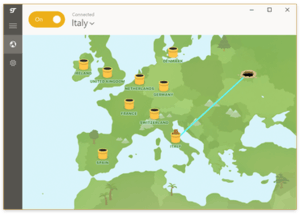TunnelBear
TunnelBear (also known as the TunnelBear VPN) is a public virtual private network (VPN) service based in Toronto, Canada. The company was founded by Daniel Kaldor and Ryan Dochuk in 2011. In March 2018, TunnelBear was acquired by McAfee.[1]
 TunnelBear connected to a server in Italy | |
| Developer(s) | TunnelBear Inc. (2011–2018) McAfee (2018–present) |
|---|---|
| Operating system | Android, Windows, macOS, iOS, Linux |
| Available in | English |
| Type | Virtual Private Network |
| License | Subscription business model, with a freeware client app |
| Alexa rank | 18,294 |
| Website | tunnelbear |
Features
A freeware TunnelBear client is available on Android, Windows, macOS and iOS. There is also a Google Chrome and Opera browser extension.[2] Alternatively, Linux distros can be configured to use TunnelBear.[3]
Like other public VPN services, TunnelBear has the ability to bypass content blocking in most countries.[4]
All clients use AES-256 encryption with the exception of the client for iOS 8 and earlier, which uses AES-128.[5] When connected, the user's actual IP address will not be visible to the websites visited.[6] Instead, the websites and/or computers would be able to see the spoofed IP address provided by TunnelBear VPN.
TunnelBear also offers a corporate VPN service called "TunnelBear for Teams."[7]
Pricing
TunnelBear VPN is a 'freemium' product. The trial version provides 500MB of VPN data per month before the user would have to either disconnect or purchase subscription for unlimited data.
References
- Sawers, Paul (8 March 2018). "McAfee acquires VPN provider TunnelBear". VentureBeat. Retrieved 8 March 2018.
- Paul, Ian (19 May 2015). "How to easily secure your web browsing with TunnelBear's free Chrome extension". PC World. IDG. Retrieved 20 June 2015.
- Robinson, John (20 March 2014). "TunnelBear Befriends Penguins with Limited Linux Support". TunnelBear. Archived from the original on 1 February 2016. Retrieved 6 August 2016.
we’re excited to announce that you can now connect to TunnelBear on Linux! We currently have apps for Windows, OSX, iOS and Android. While we aren’t quite ready to build a full application for Linux, we are now offering settings and instructions for manual configuration of a connection to the TunnelBear network (for Giant and Grizzly TunnelBears). We’ve successfully tested these settings on new installs of Mint and Ubuntu in the office. We want to send a big thank you to the TunnelBear Science Division Volunteers (our Beta group) who helped test these settings on half a dozen other Linux distributions.
- Klosowski, Thorin (1 June 2015). "Streaming Content From Overseas: The Complete Lifehacker Guide". Lifehacker. Gizmodo. Retrieved 20 June 2015.
- "Rawwwr! Even Stronger Encryption". TunnelBear's Online Privacy Blog. 17 March 2015. Retrieved 25 June 2017.
- Boxall, Andy (13 May 2015). "Watch U.S. Netflix anywhere with TunnelBear, now available as a Chrome extension". Digital Trends. Designtechnica. Retrieved 20 June 2015.
- "TunnelBear for Teams". TunnelBear. Retrieved 17 May 2018.